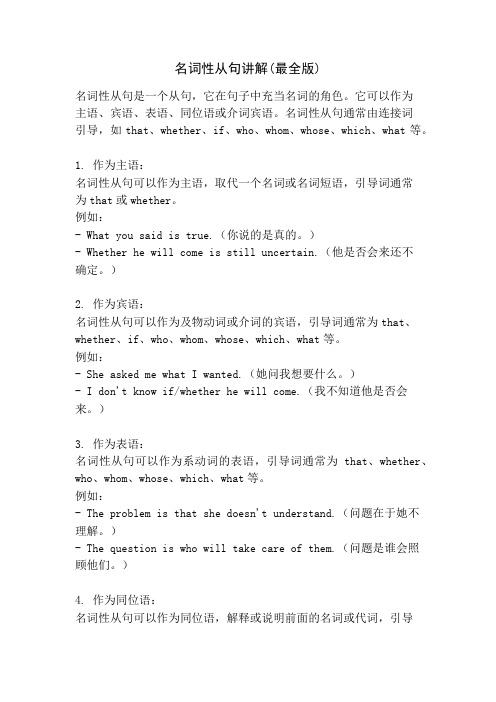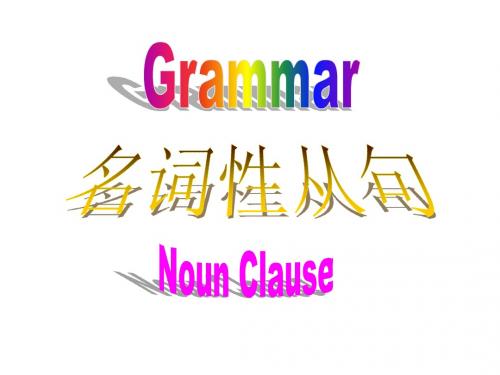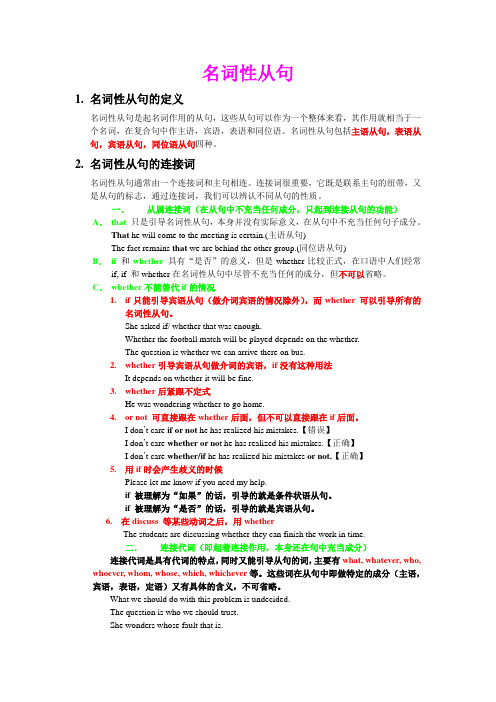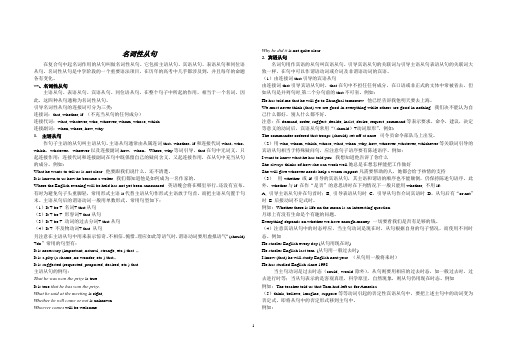名词性从句
名词性从句讲解(最全版)

名词性从句讲解(最全版)名词性从句是一个从句,它在句子中充当名词的角色。
它可以作为主语、宾语、表语、同位语或介词宾语。
名词性从句通常由连接词引导,如that、whether、if、who、whom、whose、which、what等。
1. 作为主语:名词性从句可以作为主语,取代一个名词或名词短语,引导词通常为that或whether。
例如:- What you said is true.(你说的是真的。
)- Whether he will come is still uncertain.(他是否会来还不确定。
)2. 作为宾语:名词性从句可以作为及物动词或介词的宾语,引导词通常为that、whether、if、who、whom、whose、which、what等。
例如:- She asked me what I wanted.(她问我想要什么。
)- I don't know if/whether he will come.(我不知道他是否会来。
)3. 作为表语:名词性从句可以作为系动词的表语,引导词通常为that、whether、who、whom、whose、which、what等。
例如:- The problem is that she doesn't understand.(问题在于她不理解。
)- The question is who will take care of them.(问题是谁会照顾他们。
)4. 作为同位语:名词性从句可以作为同位语,解释或说明前面的名词或代词,引导词通常为that、whether、who、whom、whose、which、what等。
例如:- The fact that he lied surprised me.(他撒谎的事实让我感到惊讶。
)- His belief that she will succeed is unwavering.(他坚信她会成功。
名词性从句

出品
三、宾语从句
在句中充当及物动词或介词宾语的句子叫做 宾语从句。 我不知道你会来这里。 I don’t know (that) you will come here.
三、宾语从句
1、用作及物动词的宾语 (1) They pretended that they were reading in the room. (2) I didn’t know what they were talking about.
以it作形式主语,把主语从句后置的常 用句型有:
1. It+be+形容词+that从句
It is/was certain that – clause
clear
important necessary probable possible
出品
(1)It is certain that she will do
出品
一、主语从句
在句中充当主语的从句叫做主语从句。 他星期三来这里是肯定的。
That he will come here on Wednesday is certain.
注意:从句作主语时,就算是句子意思完整,都 要加上从属连词that, 而且that不能省略,不充当 成分仅起连接作用。 他星期三是否来这里还不肯定。 Whether he will come here on Wednesday is not certain. 注意:主语从句表示“是否” 只用 “whether” 而不用“if”
well in her exam.
(2) It is probable that he told her everything.
www.010englBiblioteka 出品
名词性从句

语序:陈述语序
在句中充当主语的从句称为主语 从句。英语中主语从句的句型可分 为两大类: 直接将主语从句放在主语位置上; 用it作形式主语,将真正的主语从 句后移,放在其他成分后。
让我们先说说第一类吧!
一、连接词(只起连接作用,在从句中不充当句子成分)
that:无词义。 e.g.: 他赢得比赛一事在我国引起巨大轰动。 That he won the game made a tremendous stir in our country. whether:“是否”。可单独使用,也可与or或or not连用。 e.g.: 我们明天是否能去春游取决于天气。 Whether we can go for a spring outing depends on the weather. 他们是否会来还未告诉我们。 Whether they will come has not been told to us.
四、主语从句与主谓一致
一个从句作主语时,谓语动词通常用单数形式, 特别是用it作形式主语的句型。 e.g.: Whether this kind of chemicals is better has not been tried.
当what引导主从,应遵循意义一致原则,谓语动 词选用相应形式。表语是复数时,谓语动词用复数 形式。 e.g.: What we do willingly is easy. What they were searching for were the missing gems.
Introduction
名词性从句:包括四种:主语从句、表语从句、宾语从
句、同位语从句。
连词:引导名词性从句的连词有以下三类
连接词:只起连接作用,在从句中不充当句子成分; 连接代词:连接主从句,并在从句中作主语/宾语/表 语/定语; 连接副词:连接主从句,并在从句中作时状/地状/原 因状/方式状。
名词性从句完整版

注意事项:that在从句中不可省略的情况有:宾语从句中引导词that省略;主语从句中引导词that不可省略;表语从句中引导词that不可省略。
例子:I think (that) you are right. 宾语从句中引导词that省略。
虚拟语气的时态:与现在事实相反,从句和主句的时态均为一般过去时
虚拟语气的使用场合:在某些从句中,如条件状语从句、让步状语从句等
与过去事实相反的情况
虚拟语气的形式:与过去事实相反,从句使用“had+过去分词”,主句使用“would+have+过去分词”
虚拟语气的使用:表示与过去事实相反的假设情况,常用于表达遗憾、后悔等情感
例子:When he comes, we will have a party. (时间状语从句)
宾语从句
添加标题
添加标题
添加标题
添加标题
特点:在句子中句叫做宾语从句。
种类:陈述句、一般疑问句、特殊疑问句和祈使句。
连接词:that、if、whether等。
汇报人:XX
感谢观看
虚拟语气的例子:If I had known the answer, I would have told you.(如果我早知道答案,我早就告诉你了。)
与真实情况的比较:与真实情况相比较,虚拟语气表达的是与过去事实相反的情况,而不是真实发生的情况
与将来事实相反的情况
虚拟语气的形式:与将来事实相反,从句使用“if+主语+were/did+动词原形”,主句使用“would+动词原形”
05
名词性从句的特殊用法
从句中的省略现象
名词性从句

名词性从句1.名词性从句的定义名词性从句是起名词作用的从句,这些从句可以作为一个整体来看,其作用就相当于一个名词,在复合句中作主语,宾语,表语和同位语。
名词性从句包括主语从句,表语从句,宾语从句,同位语从句四种。
2.名词性从句的连接词名词性从句通常由一个连接词和主句相连。
连接词很重要,它既是联系主句的纽带,又是从句的标志,通过连接词,我们可以辨认不同从句的性质。
一.从属连接词(在从句中不充当任何成分,只起到连接从句的功能)A.that 只是引导名词性从句,本身并没有实际意义,在从句中不充当任何句子成分。
That he will come to the meeting is certain.(主语从句)The fact remains that we are behind the other group.(同位语从句)B.if和whether具有“是否”的意义,但是whether比较正式,在口语中人们经常if, if 和whether在名词性从句中尽管不充当任何的成分,但不可以省略。
C.whether不能替代if的情况1.if只能引导宾语从句(做介词宾语的情况除外),而whether 可以引导所有的名词性从句。
She asked if/ whether that was enough.Whether the football match will be played depends on the whether.The question is whether we can arrive there on bus.2.whether引导宾语从句做介词的宾语,if没有这种用法It depends on whether it will be fine.3.whether后紧跟不定式He was wondering whether to go home.4.or not 可直接跟在whether后面,但不可以直接跟在if后面。
名词性从句

表语从句( the Predicative Clause ) The question is who can do the experiment. The reason for his lateness was that he got up late. China is no longer what she used to be.
连接词 ( Conjunctions )
that, whether/if(只用于宾语从句), as if (只用于表语从句) 连接代词( Conjunctive pronouns )
who, which, what, whose(宾语从句)
连接副词( Conjunctive adverbs )
when, where, how, why
B (4) These photographs will show you ______. A. what does our village look like B. what our village looks like C. how does our village look like D. how our village looks like A (5) _____ he said at the meeting astonished everybody present. A. What B. That C. The fact D. The matter D for the violin. (6) He asked _____ A. did I pay how much B. I paid how much C. how much did I pay D. how much I paid
பைடு நூலகம்
主语从句( the Subject Clause ) Whether we will visit the Great Wall tomorrow has not been decided. That he will come is certain. It is certain that he will come. How this happened is still a question. What he said at the meeting is important.
名词性从句

名词性从句在复合句中起名词作用的从句叫做名词性从句。
它包括主语从句、宾语从句、表语从句和同位语从句。
名词性从句是中学阶段的一个重要语法项目,在历年的高考中几乎都涉及到,并且每年的命题各有变化。
一、名词性从句主语从句、表语从句、宾语从句、同位语从句,在整个句子中所起的作用,相当于一个名词。
因此,这四种从句通称为名词性从句。
引导名词性从句的连接词可分为三类:连接词:that, whether, if (不充当从句的任何成分)连接代词:what, whatever, who, whoever, whom, whose, which.连接副词:when, where, how, why1.主语从句作句子主语的从句叫主语从句。
主语从句通常由从属连词that,whether,if和连接代词what,who,which,whatever,whoever以及连接副词how,when,Where, why等词引导。
that在句中无词义,只起连接作用;连接代词和连接副词在句中既保留自己的疑问含义、又起连接作用,在从句中充当从句的成分。
例如:What he wants to tell us is not clear. 他要跟我们说什么,还不清楚。
It is known to us how he became a writer. 我们都知道他是如何成为一名作家的。
Where the English evening will be held has not yet been announced. 英语晚会将在哪里举行,还没有宣布。
有时为避免句子头重脚轻,常用形式主语it代替主语从句作形式主语放于句首,而把主语从句置于句末。
主语从句后的谓语动词一般用单数形式。
常用句型如下:(1)It + be + 名词+ that从句(2)It + be + 形容词+ that从句(3)It + be + 动词的过去分词+ that从句(4)It + 不及物动词+ that 从句另注意在主语从句中用来表示惊奇、不相信、惋惜、理应如此等语气时,谓语动词要用虚拟语气“(should) +do”常用的句型有:It is necessary (important, natural, strange, etc.) that …It is a pity (a shame, no wonder, etc.) that…It is suggested (requested, proposed, desired, etc.) that主语从句的例句:That he was won the prize is true.It is true that he has won the prize.What he said at the meeting is right,Whether he will come or not is unknown.Whoever comes will be welcome. Why he did it is not quite clear.2. 宾语从句名词句用作宾语的从句叫宾语从句。
名词性从句完整版

名词性从句一.概念在句子中起名词作用的句子叫名词从句(Noun Clauses).名词从句的功能相当于名词词组,它在复合句中能担任主语、宾语、表语、同位语、介词宾语等,因此根据它在句中不同的语法功能,名词从句又可分别称为主语从句、宾语从句、表语从句和同位语从句。
二.语序所有名词性从句都是引导词(在最前)+陈述句语序(即:主语在前,谓语在后.即使从句表达的是疑问含义).What we can't get seems better than what we have.The photographs will show you what our village looks like.He asked how much I paid for the violin.三.引导词引导名词性从句的引导词类别词义在从句中的作用从属连词that无任何词义仅起连接作用,在从句中不充当任何句子成分从属连词whether和if(是否)意为“是否”,表明从句意义的不确定性起连接作用,在从句中不充当任何句子成分关系代词who, whom, what,which,whose,whoever, whomever, whatever, whichever 有各自自身的意义起连接作用,并在从句中充当主、表、宾、定语等关系副词when, where, why, how, however, whenever, wherever 有各自自身的意义起连接作用,并在从句中充当状语注意:名词性从句引导词,只有that在引导主语从句后置时,以及在引导宾语从句时有时可以省.其它情况下,以及其它名词性从句引导词均不能省.注意:只有在引导宾语从句(有些情况下不能用if代替whether)以及whether引导主语从句后置时才可用if.其它情况下,以及引导其它名词性从句时均不能用if.四.分类详解主语从句在句子中作主语的句子叫主语从句.1.由从属连词that, whether引导的主语从句:▲that引导主语从句放在句首时,that不可省.That light travels in straight line is known to all. (that不能省)That he will succeed is certain. (that不能省)That he is still alive is a wonder. (that不能省)That the baby could speak made his parents very happy. (that不能省)That she became an artist may have been due to her father’s influence. (that不能省)______ you don’t like him is none of my business.(1992上海高考试题)A. WhatB. WhoC. ThatD. WhetherAnswer:C▲whether引导的主语从句一般位于句首.也可用it作形式主语,将其后置,此时whether可换为if. (if引导主语从句时,只能用it作形式主语,放在句首,而将if引导的主语从句放到句末.) Whether she will come or not is still a question.Whether the old couple enjoy the trip remains to be proved.Whether we will hold a party in the open air tomorrow depends on the weather.It was a problem whether they would support us.It remains to be seen whether it will do us harm or good.It is uncertain if he will leave for Beijing tomorrow.2.由关系代词who/whoever; whom/whomever(少); what/whatever; which/whichever; whose 引导的主语从句.Who will the win the scholarship is unknown.Who will be sent abroad to further his studies is not announced.Who murdered the present is being investigated.Whoever comes is welcome.Whoever leaves the room last ought to turn off the lightsWhoever breaks the rule must be punishedWhoever breaks this law deserves a fine.Whoever wants to see this film can go with us tonight.Whoever helped to save the drowning girl is worth praising.Who/whom he will work with is still a secret.Whom we must study for is a question of great importance.Whoever you fell in love with has nothing to do with me.whoever既用作主格也用作宾语(作宾语时不宜用whomever,因为在现代英语中whomever 已几乎不用).What you have done might do harm to other people.What must be done has been done.What is worth doing is worth doing well.What you said just now hurt her feelings.What impressed me most was his great responsibility for his work.What was once regarded as impossible has now become a reality.What surprised me most was that such a little girl could play the violin so well.Whatever the parents do is for their children.Whatever you say is of no use now.Whatever was said here must be kept secret.Which school will win the prize is not known.I read it in some book or other, does it matter which it was?Whichever you take will be yours.Whichever book you choose doesn’t matter to me.Whichever of us gets home first starts cooking.Whose relatives lost their life in the shocking earthquake hasn’t been announced.3.由关系副词when; where; why; how引导的主语从句.When the plane is to take off hasn’t been announced.Where the heroine went is not mentioned at the end of the story.Where the English evening will be held is still under discussion.Why he often comes here is known to us all.Why he didn't come here is not clear to anyone.Why the sun in the morning looks bigger than the sun at noon is very interesting.How he was successful is still a puzzle.How he managed to finish the composition in such a short time is still a mystery.How and why Einstein had come to Princeton, New Jersey is a story of struggle, success, and sadness.How much water is flowing can be measured easily. 水的流量是多少……主语从句的主谓一致问题①:单个的主语从句作主语,谓语动词用单数;如果两个或两个以上的主语从句作主语,谓语动词用复数.When and where he was born hasn’t been found.How and why he came to the lonely small island is still a mystery.When the person was murdered and why he was murdered are still unknown.When they will start and where they go have not been decided yet.②:what引导的主语从句,谓语动词可由表语来决定.What we need are women workers.What we need is more time and money.4.it作形式主语引导主语从句如果主语从句太长,为避免句子结构头重脚轻,我们可用it作形式主语,而把主语从句放在主句谓语部分之后.这样句子结构就更加平衡.此时主语从句的引导词一般是that(一般不省,亦可省略),也可以是其它引导词.▲It + be +形容词+ that-从句It’s(im)possible/probable/important/necessary/fortunate/certain/clear/obvious/likely/natural/ strange that…It is probable that he told her everything.It's strange that he didn't come yesterday.It is likely that there will be a storm tomorrow.主语从句中的虚拟语气:其中在it’s natural/important/ necessary/strange that…结构中,主语从句常用should +do的虚拟语气(美语中省去should).It was necessary that we (should) make everything ready ahead of time.It is important that every pupil (should) be able to understand the rule of school.It is natural that she should do so.It is essential that these application forms be sent back as early as possible.It is necessary that a college student ____at least a foreign language.(上海1993)A. mastersB. should masterC. masteredD. will masterAnswer:B▲It + be +名词+ that-从句It’s a pity/a shame/an honor/a fact/a surprise/a question/good news/no wonder/ common knowledge/high time that…It is a pity that you didn’t attend the lecture yesterday.It is a pity that she has made such a mistake.It’s no wonder that you’ve achieved so much progress.主语从句中的虚拟语气:其中在此结构中若为surprise, a pity, a shame, no wonder等表示惊奇、惋惜的名词时,主语从句常用should +do的虚拟语气(美语中省去should).若为advice, desire, demand, order, proposal, recommendation, requirement, suggestion等表示建议、请求、要求、命令等名词时,须用should +do的虚拟语气(美语中省去should).It is my proposal that he be sent to study further abroad.It’s a pity that I (should) miss the lecture.▲It + be + -ed 分词+ that-从句It’s said/reported/believed/thought/announced/decided/known to all /must be pointed out/must be admitted that…It is reported that the number of wild animals in Africa is decreasing.It’s announced that the hostages have been released.It’s decided that the meeting has been put off till next Monday.It’s known to us how he became a writer.其中在此结构中若为request, demand, require, beg, propose, suggest, recommend, advise, order, command, urge, desire等表示建议、请求、要求、命令等的动词,则主语从句中须用should +do的虚拟语气(美语中省去should).It is required that nobody (should) smoke here.It is desired that we(should)get everything ready this evening.It is suggested that we (should) hold a meeting next week.▲It +不及物动词+ that-分句It seems/appears/happens (to sb)/occurred to sb/turned out/doesn’t matter /make no difference that…It seems to me that you object the plan.It happened to me that I had been out when he called.It occurred to me that I forgot to shut the windows.It doesn’t matter whether he likes or not.It makes no difference that you will go today or tomorrow.常将seem, appear 等后的从句的否定转移到前面。
- 1、下载文档前请自行甄别文档内容的完整性,平台不提供额外的编辑、内容补充、找答案等附加服务。
- 2、"仅部分预览"的文档,不可在线预览部分如存在完整性等问题,可反馈申请退款(可完整预览的文档不适用该条件!)。
- 3、如文档侵犯您的权益,请联系客服反馈,我们会尽快为您处理(人工客服工作时间:9:00-18:30)。
名词性从句名词性从句的功能相当于名词词组,它在复合句中能担任主语、宾语、表语、同位语、介词宾语等,因此根据它在句中不同的语法功能,名词性从句又可分别称为主语从句、宾语从句、表语从句和同位语从句。
1)从属连词that,whether,if等;2)连接代词what,who,which,whatever,whoever,whom 等;3) 连接副词how,when,where,why 等。
常规主语从句,即句子在复合句中充当一个主语主语从句的时态:不受主句的时态影响和限制。
(1)That he finished writing the composition in such a short time surprised us all.(2)Whether we will go for an outing tomorrow remains unknown.(3)Who will be our monitor hasn't been decided yet.(4)Whom we must study for is a question of great importance.(5)What caused the accident remains unknown.(6)Whatever you did is right.(7)Who the watch belongs to is unknown.(8)What we need is time.连词位于句首不能省略为避免头重脚轻,常以形式主语it引导从句。
It+形式主语谓语+从句。
由于主语从句一般被认为是单数形式,形式主语的谓语动词、be动词+表语均为单数第三人称形式或过去式.It 作形式主语和it引导强调句的比较①主语从句常用it作形式主语,一般常用句型为:It is+{名词/形容词/过去分词}+主语从句例如:It is still a question whether she will come or not.It is strange that you should like him.It is still unknown which team will win the match.另外,还有一些比较多见的结构:It turned out that……;It has been proved that……;It happened/occurred that……;It is well-known that……等等②而强调句则不同,它的结构是:It+be+被强调部分+that+从句强调主语:It is the times that produce their heroes.时势造英雄强调宾语:It is English that Prof.Lin teaches us.强调状语:It was in shanghai that I saw the film.判断是否是强调句有一个方法,就是将that以后的“句子的其余部分”拿出来单独看,看有没有缺成分,缺的是什么成分,再把谓语动词后面that前面的那部分,带到你认为缺成分的地方,如果放进去是一句完整的句子了,那就说明是强调句。
2. 用it 作形式主语的结构(1) It is +名词+that从句It is a fact that …事实是……It is an honor that …非常荣幸It is common knowledge that …是常识(2) it is +形容词+that从句It is natural that…很自然……It is strange that…奇怪的是……(3) it +不及物动词+that从句It seems that…似乎……It happened that…碰巧……(4) it is+过去分词+that从句It is reported that…据报道……It has been proved that…已证实……3.主语从句不可位于句首的五种情况(1) if 引导的主语从句不可居于复合句句首。
(2) It is said ,(reported) …结构中的主语从句不可提前。
例如:It is said that President Jingo will visit our school next week. (3) It happens…, It occurs…结构中的主语从句不可提前。
例如:It occurred to him that he failed in the examination.(4) It doesn’t matter how/whether …结构中的主语从句不可提前。
例如:It doesn’t matter whether he is wrong or not.(5) 含主语从句的复合句是疑问句时,主语从句不可提前。
例如:Is it likely that it will rain in the evening?4. What 与that 在引导主语从句时的区别What 引导主语从句时在从句中充当句子成分,如主语.宾语.表语,而that 则不然。
例如:What you said yesterday is right.宾语从句有三种情况值得注意(1)在介词后面只能用whether不能用if。
例如①This depends upon whether we are determined to do it.②It depends on whether he is ready.③I am not interested in whether you'll come or not.④We haven't settled the question of whether we'll renew our supplies of coal for factory.(2)在动词不定式之前只能用whether不能用if。
例如①He doesn't know whether to stay or not.②She doesn't knows whether to get married now or wait.(3)在及物动词discuss后的宾语从句中只能用whether不能用if。
例如①We discussed whether we should make a change in our plan.②We were discussing whether we should discuss the business with them.同位语从句一、在复合句中用作同位语的从句叫同位语从句。
它一般跟在某些名词后面,用以说明该名词表示的具体内容。
二、可以跟同位语从句的名词通常有news,idea,fact,promise,question,doubt,thought,hope,message,suggestion,words(消息),possibility等(一般的“抽象”名词都可用)。
I’ve come from Mr wang with a message that he won’t be able to see you this afternoon.三、英语中引导同位语从句的词通常有连词that,whether,连接代词what,who。
连接副词how,when,where等。
(注:if,which 不能引导同位语从句。
)He must answer the question whether he agrees to it or not.四、有时同位语从句可以不紧跟在说明的名词后面,而被别的词隔开。
The thought came to him that maybe the enemy had fled the city.表语从句1.表语从句一定要用陈述语序。
False: The question is when can he arrive at the hotel.Right: The question is when he can arrive at the hotel.2.不可以用if,而用whether 连接表语从句(as if 例外)。
引导宾语从句时可以互换if/whether 位于介词后要用whether,位于句首时要用whether 引导表语从句,主语从句,同位语从句时要用whetherFalse: The question is if the enemy is marching towards us.Right: The question is whether the enemy is marching towards us.3.不像宾语从句,在有表语从句的复合句中,主句时态和从句时态可以不一致。
Right: The question is who will travel with me to Beijing tomorrow.Right: The question is why he cried yesterday.4.that在表语从句中不可以省掉。
表语从句的基本用法:表语从句只能置于主句之后,而主句的动词只能是联系动词。
名词性从句在be等系动词后作表语时被称为表语从句.例如: The problem is how we can get the things we need. (how 在表语从句中充当方式状语)问题是我们怎样能弄到我们需要的东西。
名词性从句的练习:1.Dad is used to smoking and drinking.There's no chance ________ I'm able to talk him into ________.A.whether;giving it up B.of whether;giving them upC.that;getting rid of them D.which;stopping it答案 C [由smoking and drinking可知,A、D中的代词错误。
B项翻译不通。
注:that引导的是一个同位语从句。
]2.Keep in mind ________ you want others to respect you,you must respect others first.A.that when B.that if C.if when D.when if答案 B [that引导一个宾语从句,宾语从句中又有一个if引导的条件状语从句。
] 3.Shenzhen was only a small fishing village compared to ________ it is now. A.which B.that C.what D.where答案 C [to后是宾语从句,is后缺表语,故用what。
